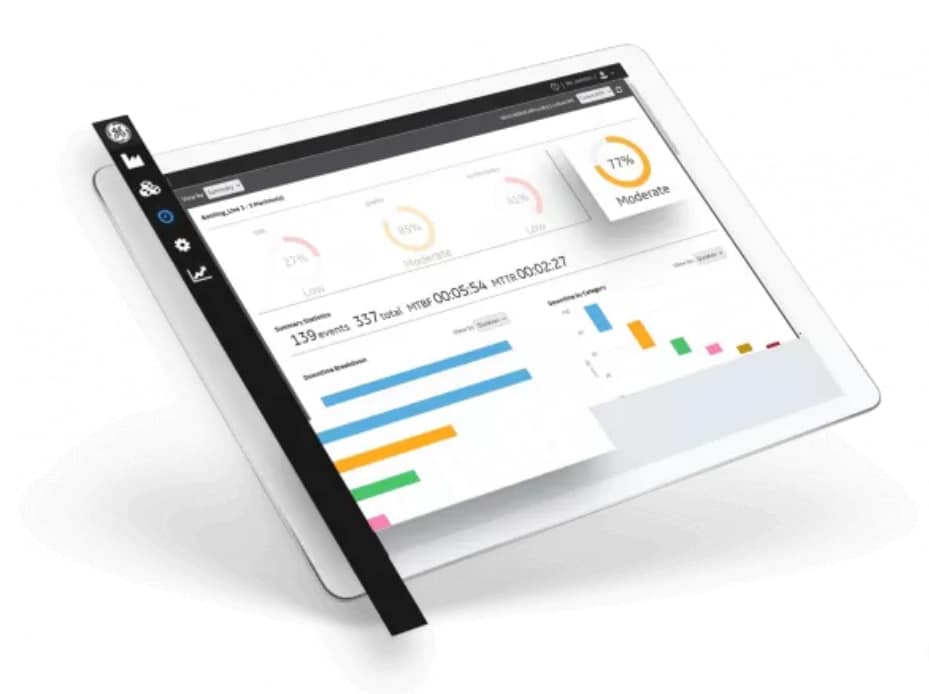Everything You Need to Know About Manufacturing Execution Systems
“This story was originally published by Joe Gerstl GE Digital
and has been republished here with permission.”
Today, manufacturing equipment is connected online like never before. Every individual step in a manufacturing process generates gigabytes of valuable data each and every time it is run and a Manufacturing Execution System (MES) software can track, control, and document the data associated with these steps.
IIoT insights and intelligence
What is MES?
MES enables Lean manufacturing through insights and intelligence powered by data integration, the Industrial Internet of Things, machine learning, and predictive analytics. By bringing the digital world together with the physical world of manufacturing, companies can transform their business and meet their critical key performance indicators (KPIs).
MES software is used to manage, monitor, and synchronize the execution of real-time physical processes and people involved in transforming raw materials into intermediate and/or finished goods. And, it supplies actionable information that helps manufacturing decision makers understand how the operating conditions on the plant floor can be optimized to further improve their production output.
Optimizing manufacturing operations
MES Functionality
MES works in real-time to enable the control of various parts of the manufacturing process in the space between automation systems and enterprise resource planning (ERP). It helps to unlock efficiencies and optimize operations to reduce costs, speed production, track genealogy and improve quality. It does this by integrating process control data from industrial automation systems on the plant floor with manufacturing operations management (MOM) systems such as quality, production, maintenance, and logistics systems.
The data collected by MES can be organized into three categories:
- Asset data: real-time sensor and measurement results
- Manufacturing data: real-time feed of manufacturing execution events
- Enterprise resources: financial impact
MES is especially good at collecting and analyzing data in highly automated fast-moving processes. It automates and integrates the information related to activities for managing production execution and optimize performance holistically, helping to balance the trade-offs between competing priorities of production operations.
One of the biggest benefits of MES is the increased visibility across the operation, which helps monitor production and catch deviations so companies can adjust processes and avoid waste. Visibility like this also enables a better understanding of operations and allows traceability across the entire scope of the production process.
MES in action
Real-world MES results
With the kind of results manufacturers are realizing with the use of MES, it’s no surprise that analyst research indicates that MES technology use is increasing at a rate faster than automation in general. This is largely due to its ability to help optimize production for operational excellence.
To help manufacturers leverage all this data available to them, GE Digital developed a Manufacturing Execution System (MES) software solution that helps to drive higher efficiency, improve quality, and reduce costs associated with manufacturing by understanding conditions on the plant floor.

GE Digital’s MES software brings together the digital world with the physical world of manufacturing, delivering holistic performance management for today’s connected enterprise.
Recently, industry analyst Gartner, identified four critical capabilities for manufacturers to consider as they choose a MES solution:
- process quality management,
- data management/data collection,
- production equipment integration,
- and enterprise integration architecture.
GE Digital’s Proficy MES software, called Proficy Plant Applications, scored as
#1 in Continuous Process Manufacturing,
#2 in Batch/ Repetitive Flow Manufacturing,
#2 in Highly Regulated Industries, and
#4 in Complex Discrete Manufacturing.
Toray Plastics (America), Inc., an American based subsidiary of Toray Industries, yielded some big results, such as significant savings in film recovery, increase in film productivity, and improved uptime by leveraging GE Digital MES technology. Toray Plastics also drove significant quality improvements by decreasing the amount of time for product traceability as well as lowering film defective rate.
GE Aviation leverages GE Digital MES to give unprecedented visibility all the way down to the routing level of their processes, helping the plant become 1.95% more productive this year. Their on-time delivery improved by 10 points versus the last year’s baseline. This means more on-time delivery to customers.
As a well-known North American tissue manufacturing and conversion company, Cascades Tissue Group, leverages GE Digital MES to provide deeper insights into its operations. With a single view of production data, operators at Cascades Tissue Group can make informed decisions that help drive quality improvements and increase manufacturing efficiency across the various sites— critical for sustainable growth and a competitive edge.
With manufacturing organizations turning to MES to make data-driven decisions about their operations, the future of industrial processes promises greater efficiency and better opportunity for growth.
To learn more about how MES can help you overcome your operational plateaus and gain higher efficiency from your operations, visit our Proficy Smart Factory (MES) page.
/ Joe Gerstl
Director of Product Management, Manufacturing Software, GE Digital
Joe Gerstl is the Director of Product Management for Manufacturing Software at GE Digital. He has worked in the software industry and in manufacturing for over 30 years spending time in various roles including engineering, sales, and product management. His experience spans working for startups through leading companies such as Microsoft and now GE. He has worked with customers in both discrete and process manufacturing segments, across all levels of the supply chain.




